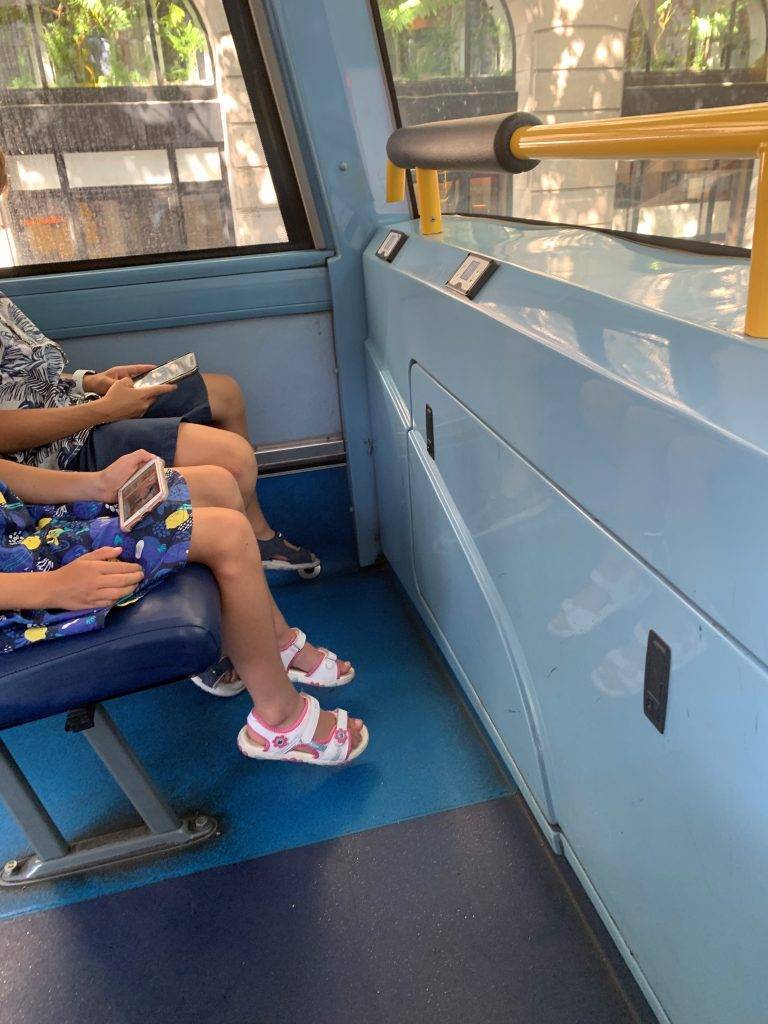By Cathy Mellett – Founder of I’m Enough

Sitting in a beautiful city, focused on absorbing the culture, experience, noise, and the view, I was taken by a young family boarding the day city exploring bus.
I was intrigued by the family situation that I was observing. The family’s young children – aged between 5 and 8 years old proceeded to take a seat at the front of the bus. Perhaps the best place on the bus to admire the city views and iconic landmarks. They were certainly tourists and out to explore the sites on this day tour of the city bus.
I noticed that rather than embracing the experience and sites, both young children pulled out their digital devices and proceeded to play games for the full duration of their ‘on the bus experience’. When the parents gave them the signal to disembark from this sightseeing bus, the children calmly put their devices away and hopped off the bus. The result, they had not done anything but play computer games. They had missed landmarks, they had not taken in any commentary and the total tourist experience had potentially been lost to them. They had perhaps reached the next level in their game though.
As someone who works closely with young people and understands the impact of positive mindfulness I am aware of the impact that high levels of digital use can have on a young mind and it’s wellbeing. I am also aware of how important family communicating, interacting and engaging with each other is to those young developing people. Sadly, this opportunity to explore, engage, connect and be in the moment was completely missed.
As I watched and observe these young children in digital land, not taking the beauty of the current moment, I sadly reflected upon the following facts and the current reality.
Fact:
- Children as young as two are developing mental health problems because of smartphone and tablets.
- An hour a day staring at a screen can be enough to make a child more likely to be anxious or depressed.
- Adolescents spending more than seven hours a day on screens are twice as likely to have been diagnosed with anxiety or depression as those who spent an hour.
- Pre-schoolers, or under-fives, who are high users are twice as likely to often lose their temper – and are 46 percent more prone to not be able to calm down when excited.
- Among 14 to 17-year-olds, more than four in ten (42.2 percent) of those in the study who spent more than seven hours a day on screens did not finish tasks.
Reality:
- Even moderate use of four hours is also associated with lower psychological well-being than one hour a day.
- The US National Institute of Health estimates children and adolescents commonly spend an average of five to seven hours on screens during leisure time. Evidence is growing of the adverse effects this has on health.
- Experts warn ‘addicted’ children risk sleeplessness, obesity and falling victim to cyber-bullying while losing valuable social skills through a lack of face-to-face contact.
Action:
- Parents and teachers should cut the amount of time children spend online or watching television while they’re studying, socialising, eating or even playing sport.
- Professor Twenge said her study, one of the biggest of its kind, backs the American Academy of Paediatrics’ established screen time limit – one hour per day for children aged two to five.
- It also suggests a similar limit – perhaps two hours – should be applied to school-aged children and adolescents, she added.
Do you think that the use of a digital device was better entertainment for a young child than exploring a new city?
We would be interested in hearing your stories, lessons learnt and views.
- How are you as a parent managing and monitoring your children’s device usage?
- What are your rules around the use of digital devices?
- What do you believe could the risks of digital device use in our young children’s lives?
Please reach out to I’m Enough with your comments.
Source
nzherald.co.nz/lifestyle/news/article.cfm?c_id=6&objectid=12154228&sfns=mo
